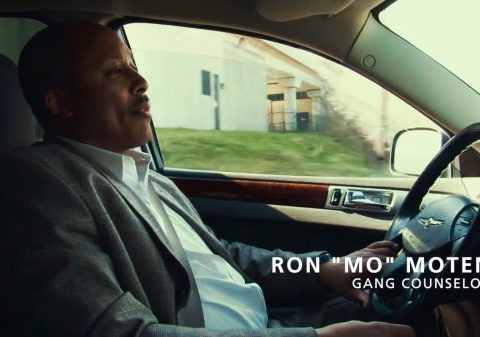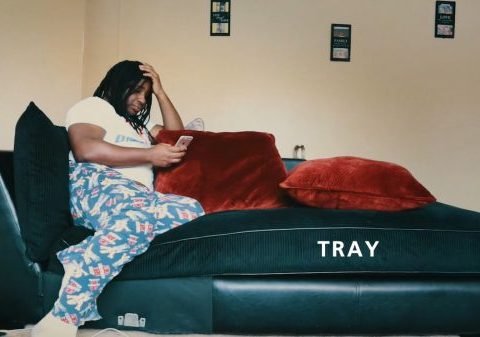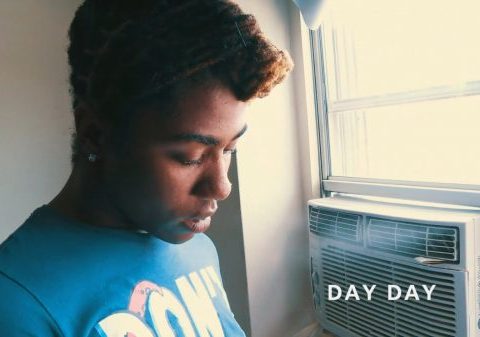Check It – Summary/ Review (with Spoilers)
There is this unfortunate need to compare films of marginalized people. Not to say one is better than the other, all the time, but because many are so used to just having that one shining star it is hard not to compare. With Kiki, I compared that to Paris is Burning and I feel the…

Spoiler Alert: This summary and review contains spoilers.
Additionally, some images and text may include affiliate links, meaning we may earn a commission or receive products if you make a purchase.
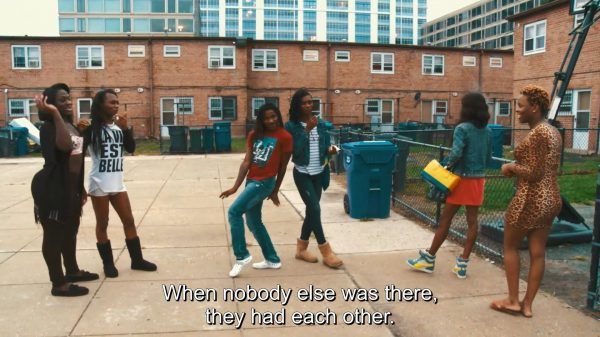
There is this unfortunate need to compare films of marginalized people. Not to say one is better than the other, all the time, but because many are so used to just having that one shining star it is hard not to compare. With Kiki, I compared that to Paris is Burning and I feel the need to compare Check It to both. For if Paris is Burning was pessimistic, Kiki was optimistic, Check It brings us young queer people at that crossroad.
Summary
The main focus of Check It is three queer individuals. There is Trey, who is a sex worker, and has a dual identity [note]They maintain a male and female Instagram and treat them almost like two different persons living in one body.[/note]. Alongside them is Alton, who is wild, flamboyant, and probably someone you remember in high school. Well, depending on the area you grew up [note]In one of the schools I went to in Newark, NJ, there were quite a few Altons.[/note]. Lastly, there is Dalton aka Day Day. The sort of leader of the Check It gang.
Together, what we get is a story about how a community, a gang, was formed because there is safety in numbers. However, as they grew stronger things got out of control. For with the gang comprised of LGBT kids, many of which don’t have family outside of the gang, are homeless, and don’t have a high school education, there are a lot of issues. Not just in terms of homo and transphobia, but because their foundations aren’t really made.
Hence why we see quite a few of them on a DC block called K Street being teenaged sex workers. For while we may see men like Ron “Mo” Moten invest in them, alongside a boxing coach named Duke, they aren’t these kids fathers. They can try to guide them, show them various opportunities, but as seen with Duke’s mentee Skittles, even if the person has talent, they have to follow through. But without that foundation, that drive, if not hustler spirit (though better-worded hope), what does that mean?
Because, in the long term, both men can’t hold these young people’s hands through life. They can do their best to understand them, adapt to them, and prepare them, but at the end of the day it’s their life. Which for some we see they will strive to get better, others seemingly may get caught up, but most make it clear not to count them out just yet. Because they’re fighters.
Collected Quote(s)
I know I’m not where I want to be, but I’m not where I was yesterday.
Highlights
Kids At A Crossroad
One of the things I enjoyed about Check It was it showed the kind of kids Kiki touched on but weren’t the focus. For, as noted in the opening paragraph, Kiki kept things optimistic. It sought out showing the community is struggling, but still, has the potential of thriving. In Check It, however, we are given a different perspective. In Check It, we aren’t really given that shining exception. That one who really makes it seem like “It Gets Better.” What we get is a bunch of young queer people without any real tools or assistance.
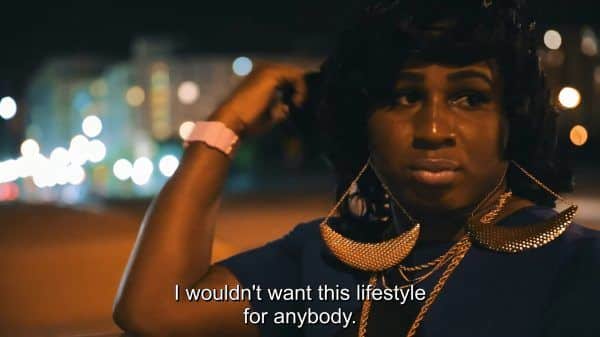
Which presents an excellent contrast to Kiki for you get to see what happens when the non-LGBT community, such as the local government and local businesses, don’t invest into them. What happens when all the community has is each other and maybe the occasional outside like Mo or Duke. People who, at most, can be there for them part-time but can’t dedicate their productive hours to them.
Something which leads to the kids doing what they have to do. Be it making a gang, known for its violence and quick temper, to create safe spaces. Participating in sex work, sometimes starting at the age of 13, in order to have money in their pocket. Alongside worrying more about what they are going to get today, and do today, since tomorrow they can be stabbed, shot, killed, raped, or what have you. Making the idea of having plans futile.
The Importance of Giving Back to Your Community
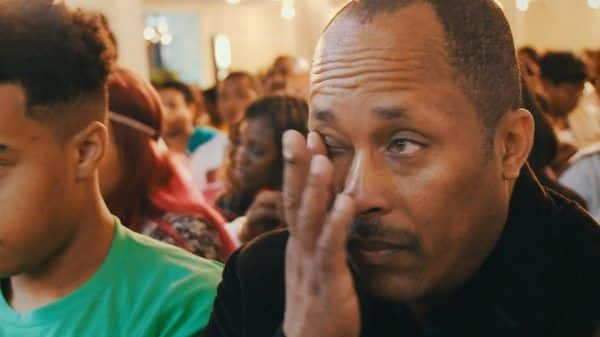
Alongside Mo and Duke, there is a gentleman named Jamal Harris. Now, while props have to be given to Mo and Duke for volunteering their time, Harris gives the type of opportunity which could change a life. What that gentleman has done for 7 years, as of the filming of the documentary, is put on a fashion show and walk a rather large group of kids through the process. Be it making the clothes, look boards, and more, you are given a taste of all it takes to have a fashion show.
Something I feel was important to show. For while Duke, through Skittles, was showing him something that could keep him out of trouble, Harris was showing these a career. He was talking money, showing them the work it takes to get it, and letting them see the final product. Much less, he takes Trey and Day Day to New York Fashion Week and lets them get real world experience.
Now, in the Black community, there is always this talk about giving back. Hence why people defended Bill Cosby because he has literally given millions of dollars to help Black kids get college scholarships[note]I know that is kind of off topic.[/note]. But, Harris took it a step further. He was in the trenches, dealing with Alton and Day-Day ready to pop off daily, and gave them hands on knowledge. He was patient, caring, and showed what the kids in Kiki got that most in Check It don’t.
Tolerance v. Acceptance
I don’t say this to crap on Duke and what he tries to do with Skittles, however, I do think he helps show some form of tolerance which still holds the ignorance of homophobia. Something I feel is important to show because it shows how complicated relationships are between people. Duke, in my mind, has no issues investing in Skittles and going the extra mile. But, he’d probably be as bad as the rest of these kids’ parents if Skittles was his biological son.
So, in many ways, Duke helps you understand the difference between tolerance and acceptance. For while I didn’t take a still to focus on this topic, believe me when I say Duke says some low-key homophobic things. Especially in terms of the way Skittles expresses themself. Yet, he still shows up and tries to make Skittles “a Man” in the only way Duke knows how.
On The Fence
The Line between Exploitation and Showing How Life Is

For both Day-Day and Trey, there was a moment when they asked to stop being filmed. Which you understand for they are really exposing themselves here. However, there is this line I never thought about until this film. The line of when these young people opening themselves up so you can understand them crosses over into the filmmakers exploiting them.
I mean, I expect to be uncomfortable hearing people talk about being raped and getting no helped. Hearing them talk about their parents throwing them out and talking like life is hopeless. However, again making comparisons, the kids of Check It aren’t like the kids Kiki and it really does come to a point where you wanna be like, “We get it. There is no need to pull back more scabs and old wounds to show this person’s humanity.”
Overall: Positive (Worth Seeing)

One of the main things you’ll take away from this is how important social programs are. Without them, all people like Day-Day and the rest have are those like Mo and Duke. People who mean way but can’t provide the type of attention and service a marginalized community needs. They need full-time advocates.
But what really pushes me to label this worth seeing is that Check It doesn’t try to leave you with a fuzzy feeling [note] It does show Day Day and them starting a company called “Check It Enterprises
so that isn’t completely true.[/note]. It introduced you to people who were given nothing and doesn’t pretend one opportunity, being exposed to something one time changes everything. For after that opportunity is over, guess where they head back to? They head back to that life where tomorrow is never promised today. So while they could dream, there is that fear of the dream never having the chance to be real. Much less, that moment of daydreaming leading to them going from a name to a statistic.
Images used for editorial and commentary purposes. All rights remain with their respective copyright holders.




